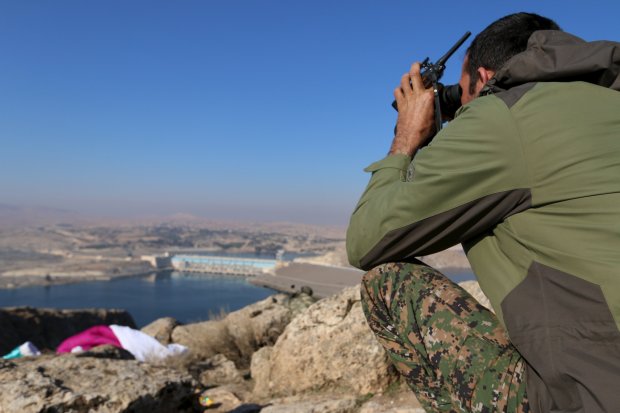PHOTO: A Kurdish fighter looks down on the Tishreen Dam on the Euphrates River
Last weekend, the Kurdish-led Syrian Democratic Forces won a notable victory in their steady advance against the Islamic State in northern Syria. The SDF took the Tishreen Dam in eastern Aleppo Province, moving to the west bank of the Euphrates River for the first time.
See Syria Daily, Dec 27: Kurdish-led Force Captures Euphrates Dam from Islamic State
Writing for the Carnegie Endowment of International Peace, Aron Lund assesses the impact of the Kurdish success for the Syrian conflict. The entire post is worth reading, given the importance of the arguments:
*The Kurdish victory exposes the weakening of the Islamic State as the SDF is “steadily downgrading jihadi defenses in northern Syria”
*The capture of Tishreen is particularly significant, as the dam produces 40% of Syria’s hydroelectric power and the bridge is “the last remaining western passage over the Euphrates outside the immediate vicinity of Raqqa”.
However, it is Lund’s projection of what happens next that deserves particular attention:
Since retaking the Kobane enclave and linking it through Tal Abyad to their towns in the east, such as Amoude, Qamishli, and Malikiya, the Syrian Kurds have dreamt of creating a fully contiguous territory along the Turkish border. The outlying Efrin enclave remains isolated and exposed, tucked in among hostile Arab and Turkish regions northwest of Aleppo. But reaching Efrin would require the Kurds to go west across the Euphrates, take Jarablus, fight their way first through the Islamic State and then through the Sunni rebels in the strategically crucial Aazaz Corridor.
It seems impossible already, and that’s before we take a major political obstacle into account: the Kurds’ key ally, the US, has promised Turkey to refrain from backing any Kurdish offensives west of the Euphrates. That’s because the driving force behind the SDF is the Kurdistan Workers’ Party, or PKK, which has its origins among Kurds in Turkey and is still fighting the government in Ankara. Instead, the Americans are most likely coaxing the SDF to keep going south into Arab territory near Raqqa in order to force the Islamic State to pull troops home from the Aleppo front.
Then again, every step west would empower the Kurdish groups politically and put pressure on their enemies, all of whom fear a Kurdish expansion into the Aleppo region. It would also unnerve Turkey, which is a goal in and of itself for the PKK. And opening a front across the river from the October Dam also makes great military sense in the war against the Islamic State. The jihadi group is currently battling on two fronts in Aleppo, against Turkish- and American- backed Sunni Islamist rebels near Marea, and the pro-Assad Tiger Forces of the Syrian Arab Army, near the Kweiris Airport.
If SDF units step across the river and start moving on Manbij, or even seek to link up with Assad’s forces in Kweiris, the Islamic State’s forces in Aleppo will be trapped in a three front war. If jihadi lines collapse under this pressure, territory could shift hands very quickly—and when time comes to divide the spoils, can the Kurds afford to be absent from the table?

